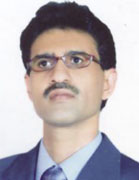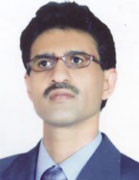
Pansieri: U.N. volunteers program is important for developing countries [Archives:2007/1110/Reportage]
December 10 2007
 |
In an exclusive interview with the Yemen Times, Flavia Pansieri, resident representative for the United Nations Development Program in Yemen, talked about the United Nations Volunteers (UNV) program in Yemen. An interview by Nawal Ali.
When did this program begin in Yemen?
The U.N. Volunteers program started in Yemen in the late '70s and has been very active since then by providing volunteers who are willing to come to Yemen and contribute to its development.
In fact, at one point, Yemen had the largest number of volunteers, but right now, the numbers are a little lower. We're certainly working to bring them up again and ensure a larger participation by international volunteers in Yemen, as well as the growing participation of Yemenis in their own nation's development.
Who are the U.N. partners involved this program in Yemen?
The program fields volunteers in a vast spectrum of specialties to support the activities of other U.N. agencies. Right now, we have volunteers working with UNDP, the United Nations High Commission for Refugees, the World Food Program and the United Nations Population Fund. Volunteers are based either in these organizations' offices or on their projects.
One of the program's most important features is the readiness and ability of volunteers to actually go to the field and live and work in the communities they're supporting. That's why they're such an important development contribution and that's why UNV assignments often allow a type of outreach that more normal project activities don't always provide.
Can you give us a hint about the program's activities for this year's International Volunteer Day celebration in Yemen?
We're going to do two things, the first of which is an in-house activity while the second is more public. The in-house activity will be a get-together for all of the volunteers in Yemen to get to know each other better because they're scattered all over the country. We'll discuss common issues and share common resolutions discovered through their activities.
The second activity, and probably more important for the general public, will be publishing an account of what it means to volunteer in Yemen. We'll interview numerous national and international volunteers based in different locations with different agencies, asking them why they're volunteering, why it's important for them to be volunteers, what they've been able to contribute and what they've gained from such experiences.
We'll do this both to increase public understanding of the important roles volunteers play, as well as encourage greater involvement by Yemenis in volunteer activities for their own development.
This doesn't have to be done exclusively through the U.N., as other types of organizations, non-governmental organizations and donors all make use of volunteer contributions. So many NGOs in this country use volunteers to pursue and accomplish their activities.
We want to acknowledge these contributions to Yemen's development, which regrettably, aren't fully accounted for because they don't get into the national account. Because they're voluntary and without financial contribution, they aren't counted. However, the fact that they're not counted doesn't mean they can't be counted because they count a lot.
A country like Yemen must become increasingly aware of what important contributions its own citizens are making to its development, even if this doesn't show up in the national accounts because it has taken the form of volunteerism.
What would you like to say to all of the volunteers in Yemen?
What I want to say is how important a program like the UNV is for any developing country because it allows leveraging the spirit of ethical imperatives and individuals' commitments to a country's development in a way that's important to be recognized.
Volunteerism also is important because it has a multi-player effect. For example, by witnessing someone else volunteering, others may be inspired to do the same.
This is something the UNV program is pursuing very consciously by ensuring that every single volunteer not only carries out his or her specific duties, but also becomes an ambassador for volunteerism in order to prompt a greater commitment in others to the same cause, while at the same time, working toward ensuring that national plans recognize and account for these contributions in the overall development planning every country undertakes.
Have you encountered any difficulties in promoting the concept of volunteerism in Yemen?
No, on the contrary, I think there's already very fertile ground for volunteerism in Yemen, as well as in other Muslim countries, because it's part of people's personal commitment.
Recognizing that all of us have a responsibility toward those who are underprivileged or discriminated against is very much embedded in the Muslim religion and very much a part of every good Muslim's life.
So, this isn't a Western concept; rather, it's a concept fully internalized within Yemeni culture. That's why we see so many activities taking the form of volunteering.
However, I think it's important to move beyond charity toward volunteer action to promote development and sustainability. I hope that all of the many young – and not so young – people who feel an ethical imperative to help those less privileged than they are will see the importance of going beyond just charity toward sustainable intervention to promote development.
Volunteers face many problems, so what do you do to ensure volunteers' rights in Yemen?
Regarding the rights of volunteers, you're absolutely right. The fact that such individuals are motivated to contribute doesn't mean they should be exploited or treated disrespectfully. Quite the contrary, I would say they deserve more respect because they do it for voluntary reasons.
For this reason, legislation is very important. One area we're working on, particularly with the Ministry of Planning, is ensuring that U.N. volunteers are recognized for the highly competent and committed expertise they bring – at the same level as any other professional – because this is important.
It's equally important to ensure that basic requirements are met regarding insurance, security and medical care because these are important supporting features clearing the way for more volunteers.
So, I do agree that volunteer rights should be respected. In fact, some time ago, the U.N. Volunteers program issued some guidelines that we're happy to share with anyone who's interested regarding the basic legal requirements that are important to regulate fairly in any country's volunteer activities.
At your International Volunteer Day celebration, what's the audience to whom you're seeking to send your message?
You'll be assisting us, as your newspaper's broad readership will allow us to reach the public with our message, which essentially is this: “You can do something too; you too have the ability and – I would say – also the responsibility to volunteer. Join us!”
The means are many fold – you can volunteer via the U.N. or with national and/or international NGOs; there are many ways to volunteer. There's more to life than just one's job; volunteering is important both as a contribution to others and also for allowing us to grow as human beings. In that regard, I'd like to share one experience that has touched me most during my more than three years in Yemen.
A few years ago, Yemen was affected by a major polio outbreak, so the World Health Organization organized a door-to-door campaign to vaccinate all children against it. Being short staffed and needing volunteers, many U.N. staff volunteered to participate in the campaign, which they found to be perhaps one of the most gratifying experiences because they could see directly how much their work was impacting people's lives.
That's probably the greatest return one can receive from volunteering – the knowledge that you've done something of which you truly can be proud.
——
[archive-e:1110-v:15-y:2007-d:2007-12-10-p:report]


